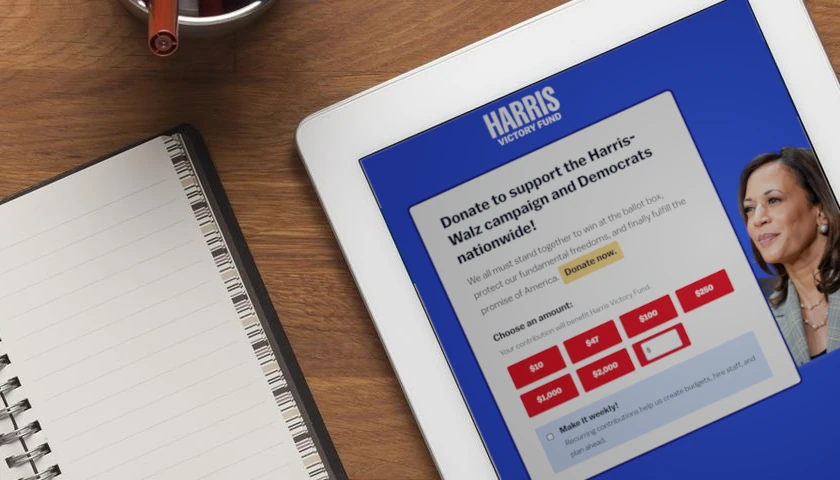by John Solomon
A congressional investigation into whether Democrats have been using the ActBlue online donation platform to cheat at fund-raising has expanded into possible foreign funding as House and Senate investigators join forces to demand the Biden administration provide them access to classified intelligence and secret money-laundering reports filed by banks.
In bombshell letters to Treasury Secretary Janet Yellen, FBI Director Christopher Wray, and Director of National Intelligence Avril Haines obtained by Just the News, House Administration Committee (HCA) Chairman Bryan Steil, R-Wis. (pictured above), and Sen. Ron Johnson, R-Wis., revealed that Congress is probing whether four specific foreign adversaries have routed money to Democratic Party campaigns during the 2024 election.
“We write to you to raise an urgent concern regarding potential illicit election funding by foreign actors,” the lawmakers wrote Yellen in a letter dated Thursday. “CHA has been investigating claims that foreign actors, primarily from Iran, Russia, Venezuela, and China, may be using ActBlue to launder illicit money into U.S. political campaigns.
“Our investigation has indicated that these actors may be exploiting existing U.S. donors by making straw donations without their knowledge,” the letter added.
Specifically, the lawmakers demanded access to any Suspicious Activity Reports (SARs) related to monies passing through Act Blue that were filed by U.S. financial institutions as part of their money-laundering monitoring activities.
SARs are some of the most sensitive documents the industry files with the government. Federal law requires banks to file SAR’s no later than 30 days after the date of initial detection of transactions that raise red flags, such as cash movements exceeding $10,000 and suspicious activity that might signal criminal activity like money laundering or tax evasion.

“We request that the Department make available to CHA and PSI staff all Suspicious Activity Reports (“SARs”) related to ActBlue, specifically regarding fraud, money laundering, identity theft, and the use of prepaid credit, debit, and gift cards in this context,” the lawmakers said.
It also requested classified briefings on possible foreign money laundering into the election from U.S. intelligence and the FBI.
ActBlue did not respond to an email message Sunday seeking comment. The group has steadfastly denied wrongdoing but says it has been cooperating with ongoing investigations.
“Democratic and progressive campaigns have trusted ActBlue’s two-decade-long track record of innovation and dependability to deliver during big fundraising moments,” ActBlue said in a statement in June celebrating its 20th anniversary in business.
“Smurfing”
Steil oversees the House committee that oversees election integrity and has sponsored legislation to crack down on weak security practices in online political fund-raising. Johnson is poised to become the chairman of the powerful Senate Permanent Subcommittee on Investigations if Republicans capture control of the chamber.
Steil told the John Solomon Reports podcast earlier this month he believes many Americans may be unwitting victims of a fraudulent fund-raising scheme. “The great concern is that people would be unwitting straw donors, meaning an individual is simply typing in their information and then using a financial payment not associated with that individual,” Steil said.
The practice has been given the name “smurfing” by campaign finance watchdogs. The practice evades FEC reporting requirements and creates the illusion of thousands of small-dollar donors to a campaign. Both Steil and Johnson began probes into ActBlue fund-raising back in 2023.
Two months ago, Steil’s committee completed a computer analysis of hundreds of thousands of small donations passing through ActBlue to Democrat candidates, and the finings triggered concerns that donors living in low income areas were being credited with making hundreds of donations through ActBlue far beyond their financial means.
Those findings led Steil to refer evidence to attorneys general in five states for possible criminal or civil investigation under consumer fraud statutes. In a few short weeks, those investigations expanded to 19 states.
Online identity theft
Last week, a Republican consultant in Wisconsin filed a lawsuit in Waukesha County Circuit Court alleging his identity and an old campaign email was used to make hundreds of donations without his permission on a credit card from California. Mark Block filed the suit under Wisconsin’s organized crime laws, saying he believed he was an identity theft victim of an ongoing racketeering scheme. His suit named a “John Doe” donor as defendant and asked a court to issue an injunction prohibiting further use of his identity and emails.
“Given Plaintiff’s political leanings, he would never consider or consent to donating to any of the ActBlue Campaigns,” the lawsuit said.
Block’s lawsuit exposed concerns about straw donations, contributions using the identity of one person but with money from another.
Back in the 1990s, the Democratic Party was rocked by the “Chinagate” scandal that revealed that Chinese-tied businessmen made millions of straw donations to Democrats to help Bill Clinton’s re-election efforts in 1996. Dozens went were convicted and some went to prison. That scandal occurred in an era before credit cards and online fund-raising were permitted in federal elections, and it required the source of the money to reimburse a donor willing to use their name to make the straw donation.
But Block’s lawsuit and the letters from Steil and Johnson to the Biden administration reveal that Congress believes the straw donation schemes may be easier in the online era, allowing someone to assume the identity of a donor digitally via an email without their knowledge, as Block alleged happened to him in his lawsuit. Lawmakers suspect pre-paid credit cards are being used to move the cash.
Iran, Russia, Venezuela, and China
“During CHA’s investigation, evidence has emerged pointing to illegal donations being broken into many smaller donations made in the name of existing ActBlue donors without their knowledge,” Johnson and Steil wrote the Biden administration officials. “This practice is known as ‘smurfing,’ where illicit actors use prepaid debit, credit, or gift cards in the names of legitimate donors to make straw donations that are virtually impossible to detect.”
The lawmakers said they were concerned about “foreign interference into our elections by foreign actors, particularly from Iran, Russia, Venezuela, and China” and that they wanted an immediate intelligence briefing “due to the potential threat this poses for the security of our federal elections.”
The letters also revealed Congress has gotten one such briefing in recent weeks that included Haines and Wray.
The lawmakers said they were frustrated that no Biden administration official appeared to be engaged with the ActBlue issue, even though several oversight letters have been sent to the government and a video of a Democrat fundraiser admitting the practice published on the Internet by conservative undercover journalist James O’Keefe. In an April video that focused on Maryland donors, James O’Keefe alleged a money laundering scheme involving ActBlue. Act Blue responded by calling O’Keefe’s videos “disinformation.”
“Failure to verify”
“Disturbingly, when Ranking Member Johnson asked you during a September 25, 2024 secure briefing about election security what the FBI was doing to investigate smurfing, you seemed clueless on the issue and had no idea if the FBI was doing anything to investigate it,” the lawmakers wrote Wray. “The other briefers—Director of National Intelligence Avril Haines and Cybersecurity and Infrastructure Security Agency Director Jen Easterly—remained silent.”
The letters also revealed that ActBlue told Congress months ago that it was not requiring donors to use the three-number CVV code on the back of credit cards, a key security tool designed to prevent fraud.
“ActBlue responded, explaining that it did not require contributors to provide their CVV when making an online contribution,” the letter to Haines stated. “This failure to verify donor identity may have allowed foreign actors to fraudulently participate in the political process in the U.S.”
Texas Attorney General Ken Paxton revealed ActBlue made a similar revelation to his investigators and that the online fundraising platform agreed to do so going forward, at least for donations gathered in Texas.
– – –
John Solomon is an award-winning investigative journalist, author and digital media entrepreneur who serves as Chief Executive Officer and Editor in Chief of Just the News. Before founding Just the News, Solomon played key reporting and executive roles at some of America’s most important journalism institutions, such as The Associated Press, The Washington Post, The Washington Times, Newsweek, The Daily Beast and The Hill.




